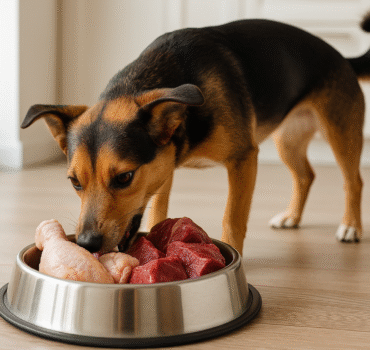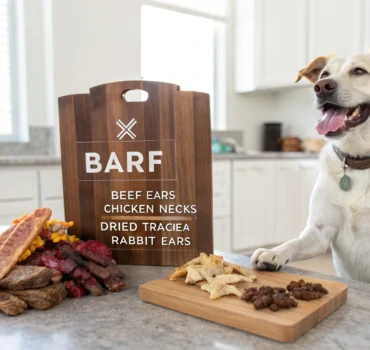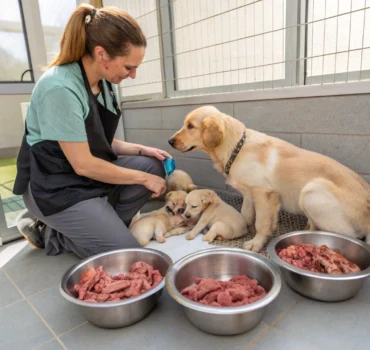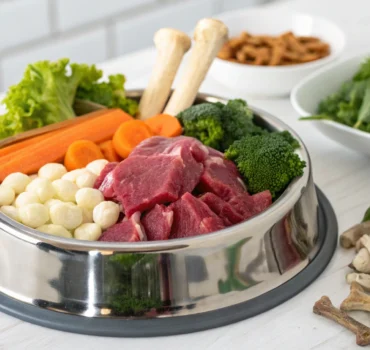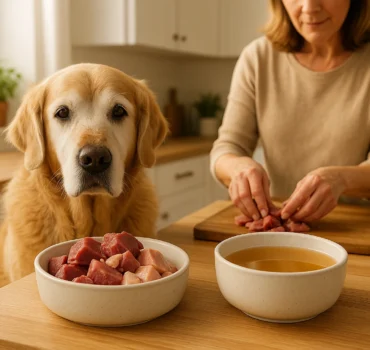Your dog’s digestive system is the foundation of their overall health. Just like humans, dogs with healthy guts tend to have stronger immune systems, better energy levels, and fewer health problems. If you’ve been wondering whether raw food could help your furry friend’s digestive issues, you’re asking the right question.
Many dog owners in Cyprus are discovering that switching to a raw diet can transform their pet’s digestive health. From reducing bloating and gas to improving stool quality, the benefits are often visible within weeks of making the change.
Understanding Your Dog’s Digestive System
Dogs have shorter digestive tracts compared to humans, designed to process meat efficiently. Their stomachs produce strong acids that can break down raw bones and kill harmful bacteria. This natural design suggests that dogs are built to handle raw food better than many processed alternatives.
The canine digestive system includes the stomach, small intestine, and large intestine, each playing a crucial role in breaking down food and absorbing nutrients. When this system works properly, your dog feels energetic, maintains a healthy weight, and produces firm, well formed stools.
However, many commercial dog foods contain ingredients that can disrupt this natural process. Fillers, artificial preservatives, and highly processed grains can be difficult for some dogs to digest, leading to various digestive problems.
Common Digestive Problems in Dogs
Before exploring how raw food helps, let’s look at the digestive issues many Cyprus dog owners face:
Frequent loose stools or diarrhea often indicate that your dog’s system is struggling to process their current food. This can be especially common during hot Cyprus summers when dogs may be more sensitive to certain ingredients.
Excessive gas and bloating usually signal that food isn’t being properly broken down in the digestive tract. While some gas is normal, constant flatulence often points to dietary issues.
Vomiting after meals can happen when dogs eat too quickly, but it may also indicate that certain ingredients don’t agree with their system.
Constipation or difficulty passing stools might suggest that your dog isn’t getting enough moisture in their diet or that certain ingredients are causing blockages.
Bad breath and dental problems often start in the gut. Poor digestive health can contribute to oral health issues that many dog owners notice first.
How Raw Food Supports Digestive Health
Raw food diets work with your dog’s natural digestive design rather than against it. Here’s how this approach can improve your pet’s gut health:
Natural Enzymes and Probiotics
Raw meat contains natural enzymes that help break down proteins and fats. These enzymes are destroyed during the cooking process used in commercial kibble production. When your dog eats raw food, they’re getting these helpful digestive aids in their natural form.
Raw food also contains beneficial bacteria that support a healthy gut microbiome. These good bacteria help crowd out harmful microorganisms and support proper digestion.
Improved Protein Digestion
Dogs are designed to digest animal proteins efficiently. Raw meat provides protein in its most natural form, making it easier for your dog’s system to break down and absorb. This can lead to better muscle development and more stable energy levels throughout the day.
Many Cyprus dog owners report that their pets seem more satisfied after raw meals, often eating smaller portions while maintaining healthy weight and energy.
Better Hydration
Raw food contains natural moisture that helps keep your dog hydrated from the inside out. This extra hydration supports healthy digestion and can help prevent constipation, especially important during Cyprus’s warm climate.
Proper hydration also helps the kidneys function better, reducing the workload on your dog’s entire system.
Reduced Inflammatory Ingredients
Commercial dog foods often contain ingredients that can trigger inflammation in sensitive dogs. Artificial colors, preservatives, and certain grains may cause digestive upset in some pets.
Raw diets eliminate most of these potential irritants, giving your dog’s digestive system a chance to heal and function normally.
Signs Your Dog’s Digestion is Improving
When you switch to raw food, you’ll likely notice several positive changes in your dog’s digestive health:
Firmer, smaller stools are often the first improvement owners notice. Raw fed dogs typically produce less waste because they’re absorbing more nutrients from their food.
Reduced gas and bloating usually happen within the first few weeks of switching. Your dog’s stomach will feel less distended after meals.
Better breath often improves as digestive health stabilizes. While raw bones also help clean teeth, much of the improvement comes from better gut health.
More consistent bathroom habits develop as your dog’s system adjusts to processing food more efficiently.
Increased energy and alertness often follow as your dog begins absorbing nutrients more effectively.
Supporting Your Dog’s Digestive Transition
Making the switch to raw food requires some planning to ensure your dog’s digestive system adjusts smoothly:
Start with easily digestible proteins like chicken or turkey. These are gentler on the stomach than red meats and help your dog’s system adapt gradually.
Introduce new ingredients slowly, adding one new protein source every few days. This helps you identify any foods that might not agree with your particular dog.
Consider adding digestive support during the transition. Bone broth can provide extra hydration and nutrients while being gentle on the stomach.
Monitor your dog’s stool quality and energy levels throughout the transition. Some temporary digestive upset is normal as your dog’s system adjusts, but persistent problems may indicate the need to slow down the transition process.
The Role of Bone Broth in Digestive Health
Bone broth deserves special mention for its digestive benefits. This nutrient rich liquid contains collagen, minerals, and amino acids that support gut lining health.
Many Cyprus dog owners find that adding bone broth to their pet’s raw meals helps with the transition and provides ongoing digestive support. You can make bone broth at home using raw bones and water, simmering for 12 to 24 hours.
The gelatin in bone broth can help heal and seal the gut lining, which is especially beneficial for dogs with sensitive stomachs or previous digestive issues.
Raw Feeding and Gut Microbiome
Your dog’s gut contains trillions of bacteria that play crucial roles in digestion, immune function, and overall health. The balance of these bacteria can be significantly influenced by diet.
Raw diets tend to promote a more diverse and stable gut microbiome compared to highly processed foods. This bacterial diversity is associated with better digestive health and stronger immune function.
The natural probiotics in raw meat, along with the absence of artificial preservatives, create an environment where beneficial bacteria can thrive.
Addressing Common Concerns
Some dog owners worry about the safety of raw food for digestive health. While proper handling is important, healthy dogs are well equipped to handle the bacteria naturally present in raw meat.
The strong stomach acid in dogs creates an environment that’s hostile to harmful bacteria while allowing beneficial microorganisms to pass through to the intestines where they’re needed.
If your dog has existing digestive issues or is taking medications, consult with a veterinarian familiar with raw feeding before making the switch.
Long Term Digestive Benefits
Dogs who eat raw diets long term often show sustained improvements in digestive health. Their systems become more efficient at processing food, leading to better nutrient absorption and less waste production.
Many owners report that their dogs maintain stable digestive health well into their senior years, with fewer age related digestive problems compared to kibble fed dogs.
The anti inflammatory effects of raw diets may also help prevent digestive issues that can develop over time with processed food consumption.
Conclusion
Your dog’s digestive health affects every aspect of their wellbeing, from energy levels to immune function. Raw food diets work with your pet’s natural digestive design, providing the enzymes, probiotics, and easily digestible nutrients their system needs to thrive.
While the transition requires some planning and patience, many Cyprus dog owners find that the digestive health improvements make the effort worthwhile. Firmer stools, reduced gas, better breath, and increased energy are just some of the benefits you might notice.
If you’re ready to support your dog’s digestive health naturally, consider exploring the raw food options available through Yummy Dog Food. Our BARF diet selections are designed to provide the balanced nutrition your dog needs for optimal digestive function.
Ready to improve your dog’s digestive health? Browse our selection of raw dog food and start your pet’s journey to better gut health today.
Frequently Asked Questions
How quickly will I see digestive improvements after switching to raw food? Most dogs show initial improvements within 1 to 2 weeks, with full digestive adaptation typically occurring within 4 to 6 weeks of consistent raw feeding.
Can raw food help dogs with sensitive stomachs? Yes, many dogs with sensitive stomachs benefit from raw diets because they eliminate common irritants found in processed foods and provide easily digestible nutrition.
Is bone broth necessary for digestive health on a raw diet? While not necessary, bone broth can provide additional digestive support and is especially helpful during the transition period or for dogs with existing digestive sensitivities.
What should I do if my dog has digestive upset during the transition? Slow down the transition process, stick to easily digestible proteins, and consider adding bone broth. If problems persist, consult with a veterinarian familiar with raw feeding.
How does raw feeding affect stool quality? Raw fed dogs typically produce smaller, firmer stools with less odor because they absorb more nutrients from their food, resulting in less waste.

